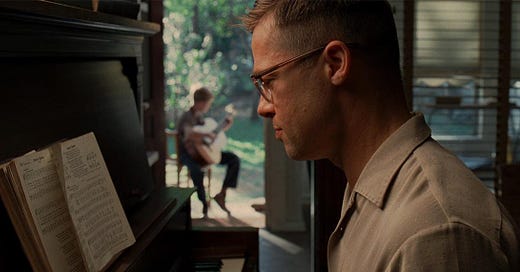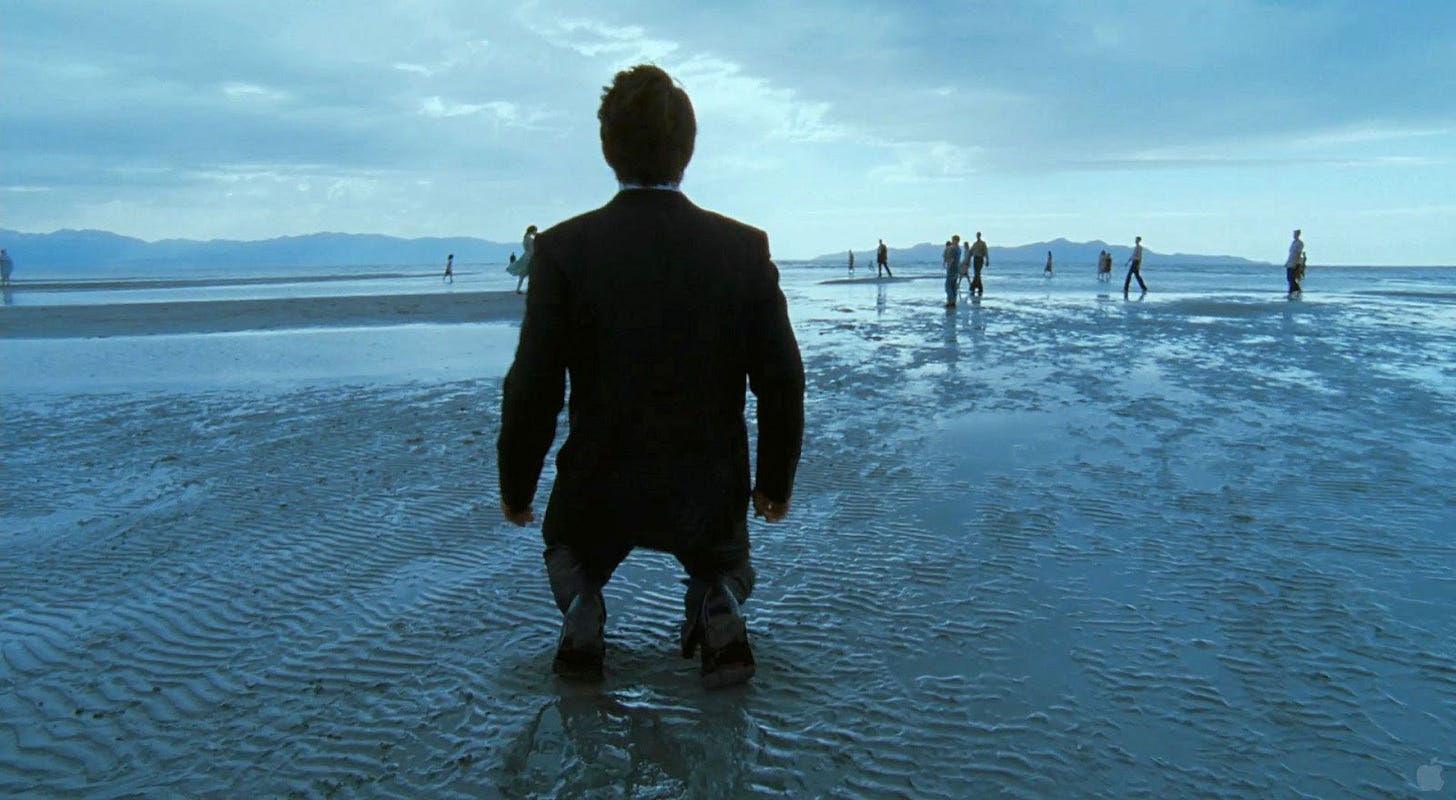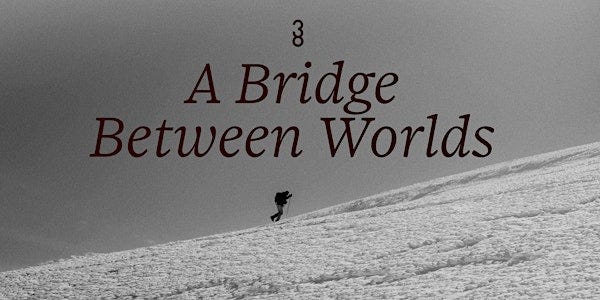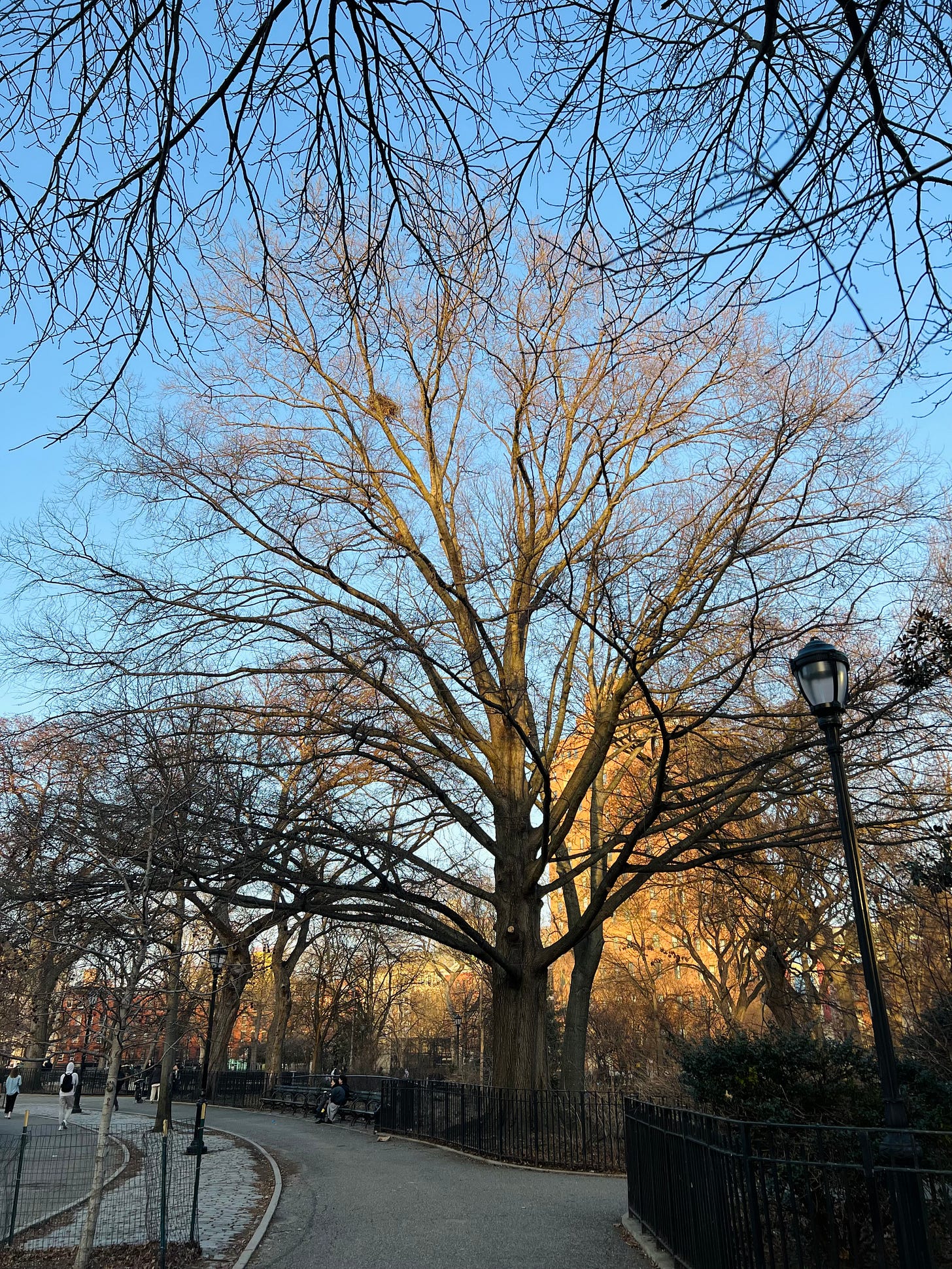It’s so easy to lose the golden thread, the thread that guides us through the labyrinth of life.
It happens to me when I get stuck in my head.
And that can happen oh so quickly.
It happens when I look for an optimal solution to a complicated issue. Like, where to move. Much cheaper than NYC. Access to nature. But also enough culture and community to connect with. Enough local weirdos. An active dating scene? Lower taxes? Distance to family? Local language? Car vs. walkable. . . lost in a maze of my own making.
Simple questions can ground us.
If I had one more year — or ten — would I still care about this?
If I loved myself truly and deeply, would I let myself experience this?
If I could only select based on one factor, which would it be?
That’s how I started dropping the weight. With infinite time and space, I’d keep all the books. But time is precious. Space is valuable. Empty space can give form to the new. Constraints are very useful.
A couple of weeks ago, I watched the gorgeous and cryptic The Tree of Life, a two-hour poem of a film, a prayer set to the rhythm of life, an exploration of the sacred beauty of our world. I wept like a baby at the end.
“Don’t do it like I did, promise me that,” the movie’s father tells his son. “I dreamed of being a great musician. I let myself get side-tracked. When you’re looking for something to happen, that was it. A lie, you lived it.”
He got lost in the maze. But is he honest?
In that moment, he continues to live the “lie,” really the story, a story like a labyrinth, one that keeps him on his path. One that he could exit.
Every day is a chance to change that lie to something truthful.
Every day we don’t show up and share our gift, both we and the world are losing out.
When we don’t follow our compass, when we don’t know what the compass is, we risk getting side-tracked.
This doesn’t have to be about work or creativity.
Your heart is a gift. So is your presence.
The partner you can be to someone is a gift only you can share.
“A lie, you lived it.”
The longest relationship I’ve had after my divorce was probably . . . half a year, more or less? I don’t keep track of the time and things fray at the edges. But yeah, it doesn’t amount to much.
I have been reading a bunch by Henrik Karlsson lately — a frustratingly good writer!
My favorite was his three-part series on his marriage. The most interesting thing I’ve read about romance in a while.
“You are born with this weird interiority that no one else can see,” he writes in Looking for Alice. “You can’t see it either at first. But if you run enough experiments you get a sense of how that inner space behaves. In particular, you can figure out which types of people can fuse with your interiority and expand it.”
Now, if you asked me about the women I’ve loved (often still feel a lot of love for? they were all, in their own ways, absolutely exceptional), I would not start with whether they “fused with and expanded my interiority.”
What did she look like? What was her energy?
How sensual was the experience with her? How was the sex?
Was she smart and curious? Did she have a big heart? What did she inspire in me?
Those kinds of questions would go through my head.
But Karlsson is aware and comfortable with his weirdness. He knows what he likes, what is important to him. What drew him into the relationship was the experience of discovery and expansion in a shared space of curiosity and care (or at least that’s the aspect he chooses to share).
“The words that came out of my mouth when I talked to her continually surprised me,” he adds in Dostoevsky as lover. His experience was intense and strange, impossible to communicate. “I remember with a cold sweat that I almost turned Johanna down because I felt confused by my inability to explain what our relationship was and why I liked it.”
I recall maybe two, maybe three times that happened to me. One was insanely painful, and it took me a long time to understand and get over my obsession. I think I stopped looking for that deep connection afterwards. Too painful when it ended. Too intimate. To be seen completely through the eyes of another? Serene. Also, terrifying.
I retreated — first to the surface where I didn’t show myself fully, then to hitting the pause on dating.
Karlsson writes about his marriage as a co-evolutionary loop, a dance unfolding over years, decades, possibly a whole life.
The type of person I’m assuming we’re looking for here is 1) someone that you will find fascinating to talk to after you’ve talked for 20,000 hours, 2) you feel comfortable with them talking through the hardest and most painful decisions you will face in your life, and 3) the conversation is wildly generative for both of you, in that it brings you out, helps you become.
It felt so intuitively right to think about the longevity of a relationship in terms of the space of communication and care. “This, I think, is a healthy way to think about love,” he writes. “It is about being invested in someone’s continual expansion.”
I began to realize how much I missed that kind of deep and evolving connection.
After my spiritual awakening, dating felt impossible.
We had to be a match emotionally, intellectually, spiritually, sexually . . . not to mention life stages, plans (kids? NYC or move?) . . . forget it. Too complicated.
Karlsson makes a good point that hit me like a bucket of cold water.
The thing is, there aren’t that many people you can have an amazing life with. Maybe 10,000, spread fairly evenly across the globe? A bit more if you’re less weird than me, perhaps. Anyway, the number is small enough that you can’t afford to be casual about it. You have to never let someone like that pass you by.
Don’t obsess over finding your perfect soulmate but do not be casual about finding one of those rare people who match your weirdness. Do not get side-tracked.
That co-evolutionary loop, that space of curiosity and care, that takes time to discover and develop.
Karlsson recommends “speedrunning” dating by “jumping directly to the strange parts.” “You do not like a category,” he writes. “You like individuals.” So “go talk to a thousand people (increasingly less randomly sampled)” and find “patterns in who makes you feel excited and alive and true and heard.”
Which leads to another idea of his that I like — writing in public as a search query to let the right people find you.
“That is perhaps the most solid dating advice I have, by the way—show the inside of your head in public, so people can see if they would like to live in there.”
It’s time to sit with the part of me that is fixated on independence.
It’s time to sit with the fear behind it.
Did I buy freedom at the price of intimacy?
Time to adjust the compass.
Do not get side-tracked.
Do not get side-tracked.
Upcoming event: an evening of dialogue and connection at the intersection of science and spirituality.
I will be at my friend Rohan’s upcoming event A Bridge Between Worlds (link has a discount on the ticket) with scientists who are bridge-builders, including Dr. Alan Lightman, Dr. Neil Theise and others.
Thursday, April 3rd. Stop by and say hi!
Join us for an evening with scientists who are bridge-builders, helping us ask profound questions about our yearning for ultimate meaning, the nature of consciousness, and what lies beyond the limits of what we can measure.
Dr. Alan Lightman on scientific materialism and spirituality, Dr. Scarlet Soriano on spirituality in medicine, Dr. Neil Theise on complexity theory and Zen Buddhism, and Dr. Katy Hinman on science education as a spiritual resource.
New video: journaling prompt.
Youtube: If I loved myself truly and deeply, would I let myself experience this?
I’m experimenting with lots of prompts for mindbody writing. This one I got from Love Yourself Like Your Life Depends On It, Kamal Ravikant.
Pen and paper, timer 20+ minutes, stream of consciousness writing, always following the trail of emotional charge and discomfort/avoidance.
At first, I wrote about negative behaviors that I would no longer tolerate. Then I wrote about changes I would make to my environment (less noise, clutter). Then changes to my state (less fear, less guilt).
This led me to what I would not hold back on if I loved myself — I experienced a brief wave of sadness, then anger.
Finally, I would not hold myself back in my writing. I would write about what I love and believe.
After three pages, I ended with: “There is a whole life waiting and I am not getting started…” (Da wartet ein ganzes Leben und ich fange nicht an…”)
A tiny 20-minute roller coaster. This is why I love mindbody writing. It helps me release, let go, gain insight, and re-write the story of my life. And sometimes I even find creative gold in the shadow.
Read & listen.
James Bailey: Where our heart echoes. An incredibly beautiful piece about the bonds that form in life and work, rich in wisdom, moved me to tears.
“Here is where we love and learn to let go. There is where we begin again, loving anew,” I said, witnessing the words as they left my lips. “If love and pain form the rhythm of the heart, here and there are the spaces they echo.”
I feel very in between the here and the there — a here that is losing reality and a there I cannot yet see. That space in-between offers room for unfolding. And James reminded me that the bonds of love don’t have to break with distance.
I also love that he carries a worn-out journal specifically "for life's great teachers."
I love The Emerald podcast and especially the latest: Singing to the beloved in times of crisis. It’s all about spirit, the breath of life, community, movement, the power of song and voice, and the strange “battle to monetize the wound.”
“The real gulf of America is the divide between us and our neighbors.”
Tom Morgan: The Most Important Word in the World. Shame, anger, choices, transformation. I read everything Tom writes but this one hit on so many ideas that are alive for me. . .
Throughout the years of my dark night of the soul, I fell from being a Managing Director at an investment bank to being rejected for $20,000 a year graduate jobs.
. . . At the very bottom of my private abyss the only thing I could feel was shame. But an incoherent, primal shame tied to the sense that I’d done something wrong. That I was damned and it was fundamentally my fault.
But this shame isn’t your fault. In fact the more you’re suffering, the more you may be learning.
Mona Sobhani: Clearing the Ashes *[Pt. 8]* I was so lucky to read this while editing The Weight. Mona offers her thoughts on an “apprenticeship with sorrow,” the practices and rituals that help us drop the weight and move through life.
“Hack #1: I framed the activity as active retrospective grieving and clearing for myself. Not like, “Let me get rid of this garbage that’s weighing me down” kind of way (which feels like a chore), but rather, “I have never properly thanked or honored all these moments and events in my life and I want to do that now, and kindly send them off” kind of way.
Hack #2: In the deep emotional work I’ve done over the past few years, I’ve noticed that grief, sadness, or hurt are usually underneath anger. What that means: in the middle of releasing anger, one of these sad emotions suddenly breaks through, dissolving the anger — clearly showing you that anger was just protecting sadness, which is the true emotional root.”
Mike just launched a coaching program for traders looking to face and work with their shadow.
Loved his short piece "I":
“Each day that I engage with markets, one of two “I”s may appear.
One trades from stillness. The other from craving.
One is real. The other, an illusion.
“I need … “ “I am …” “I will …” “I must …”
To trade as this “I” is not to trade a market, but to trade a concept of oneself.”
Final Verse. Rumi: The Guest House.
This being human is a guest house.
Every morning a new arrival.A joy, a depression, a meanness,
Some momentary awareness comes
as an unexpected visitor.Welcome and entertain them all!
Even if they're a crowd of sorrows,
who violently sweep your house
empty of its furniture,
still treat each guest honorably.
He may be clearing you out
for some new delight.
The dark thought, the shame, the malice,
meet them at the door laughing,
and invite them in.
Be grateful for whoever comes,
because each has been sent
as a guide from beyond.
Invite discomfort. Let it be a teacher and guide. Write with it.
Until next time!
— Frederik








Great post! “Looking for Alice” is such an essay too! Thanks for the reminder of it!